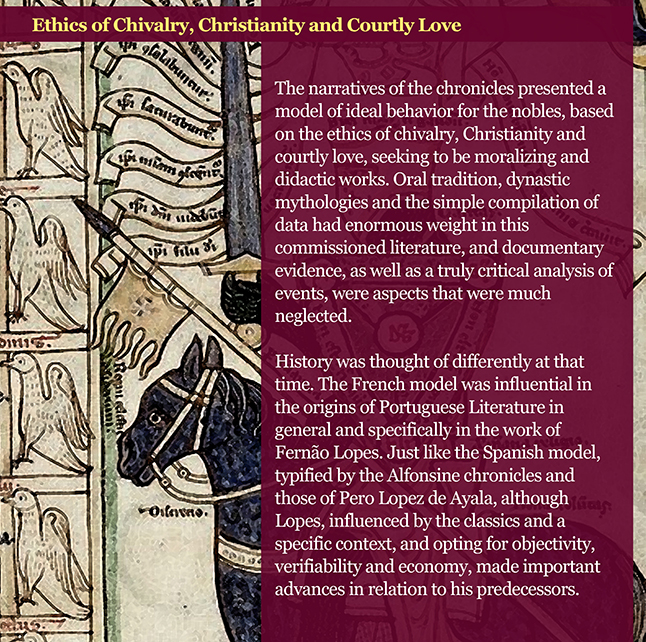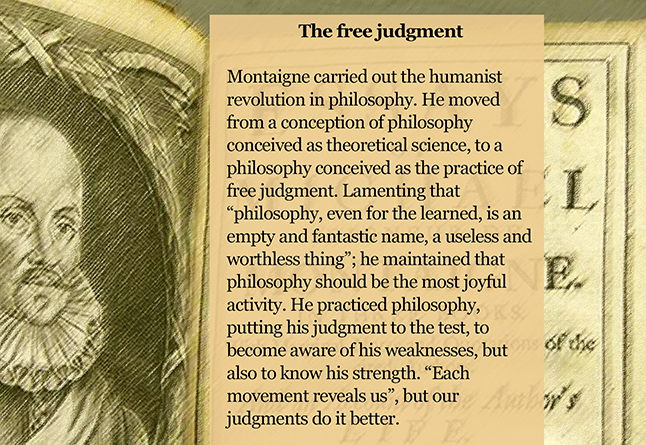The Memory of the Portuguese Throne
Fernão Lopes is considered the Father of Portuguese historiography and one of the main figures of medieval Literature. He was born in Lisbon, around 1380, and was an official scrivener and chronicler of the kingdom of Portugal and the fourth chief guard of Torre do Tombo. In 1434, he was decorated as Vassal of the King, a title only granted to a person of extreme trust of the King. He remained as head guard of the Torre do Tombo until 1454.
D. Duarte, son of King João I and D. Filipa de Lencastre, long before assuming the throne, concerned with preserving the memory of the kingdom and the people, began to record the traditions of the kingdom. The monarch began a vast undertaking of a historiographical nature with the aim of building a royal memory of Portugal. In 1418, the king appointed Fernão Lopes to the position of “chief chronicler of the kingdom”.
Historical context
Humanism expressed the deep belief in man as master of his destiny, breaking with the strong influence of the Church and religious thought. Started in Italy, the movement spread across Europe. In Portugal, the date that marks the beginning of Humanism is the year 1418, when Fernão Lopes was appointed guard of the State archives. His historical chronicles became a landmark of Humanism in Portugal.
Fernão Lopes acted within a context close to recent events in the memory of the Portuguese. The most significant were the Crisis of 1383-1385 and the Battle of Aljubarrota (1385). The battle innovated military tactics, allowing men-at-arms on foot to be able to defeat powerful cavalry. In the diplomatic field, it allowed the alliance between Portugal and England, which lasts until today.
The Avis Revolution
In Portugal, during the Low Middle Ages, the Avis Revolution took place, from 1383 to 1385. Also known as The Crisis of 1383, it refers to the succession of events and conflicts that took place in Portugal and that resulted in the end of the Afonsina Dynasty and the beginning of the Avis Dynasty. The main consequence was the weakening of monarchical power in the face of local pressures that still survived in the small territorial districts of the Kingdom and the coronation of João, Master of Avis, as D. João I and King of Portugal in 1385.
The first dynasty, also known as Afonsina or Burgundy, was founded by D. Afonso Henriques, who proclaimed himself king in 1139, and continued until D. Fernando I, who died in 1383, giving rise to a succession crisis that only resolved with the emergence of a new line of succession.
The great importance of the Avis Revolution is related to the consolidation of Portugal as a nation and the departure from Castile's pretensions to annex Portugal to its territory. The victory over the kingdom of Castile definitively established the independence of Portugal, under the command of Dom João I. The support of the commercial bourgeoisie was decisive, as it helped to provide the necessary financial resources for the maintenance of the Army. The dynasty lasted until the death of Cardinal-King D. Henrique on January 31, 1580 without leaving a legitimate heir.
In the political aspect, D. João I was strengthened as King of Portugal with the recognition of the legitimacy of the Avis dynasty through the signing of the Treaty of Windsor, in 1386, between Portugal and England and his marriage with D. Filipa de Lencastre. It resolved the dispute that divided the Kingdom of Portugal from the Kingdom of Leon and Castile, paving the way under the Avis Dynasty for one of the most remarkable times in the history of Portugal, the Age of Discovery.
Popular, D. João I, succeeded D. Duarte, a king more allied to the aristocracy. The feudal power of the sons of D. João I grew and with it the predominance of the nobility, which had been seriously shaken by the crisis of independence. Soon after the death of D. Duarte, there was the civil war, the insurrection of Lisbon against the dowager queen D. Leonor de Aragão and the election of the Infant D. Pedro.
Certainly, Fernão Lopes had made contact with testimonies of the events, as these events were reported in his Chronicle of D. João I, of 1443. In this way, he consulted the protagonists involved in the resistance against Castile and in the peace signed in the year 1411 with the same kingdom, through the Treaty of Ayllón, ratified in 1423. Thus, D. Duarte appointed Fernão Lopes to write down the achievements of the Avis dynasty.
Renovator of the historical chronicle
Fernão Lopes distinguished himself from his predecessors for inheriting classical, French and Iberian traditions and for giving great importance to the critical analysis of History and the documentary evidence of events, to report the facts as they really happened, with truth and objectivity, purging the opinions biases, rhetorical exaggerations and legends.
In an innovative way, he presented the people as an important historical agent, minimizing the almost exclusive role of kings and aristocracy. Therefore, he is considered a renewer of the historical chronicle genre. Lopes was one of the forerunners of scientific historiography and the founder of Portuguese historiography.
Fernão Lopes had a considerable intellectual background, a humanist sensibility and an agile and engaging literary style. His work was based on orality and the popular universe, without discarding erudite references. Of his various works, only the chronicles of D. Pedro, D. Fernando and D. João I remain.
Characteristics of Fernão Lopes' writing
Fernão Lopes had a personal style of writing, for which he became a landmark in medieval literature. He emphasized popular characteristics to the detriment of the usual protagonism. His colloquial language attracted many admirers, people who supported his way of writing and gave more value to his work, especially the historical chronicles. Even though his prose began in the period of Troubadourism, he only gained notoriety during Humanism.
Contemporary with the rise of the Avis Dynasty to the throne of Portugal, Fernão Lopes felt closely the strength of the people in the struggles for freedom and considered this aspect in the process of historical development. The history of a people, in his view, was not only constituted by the exploits of kings and knights, but also by popular movements and economic forces. In addition to the environment of the courts, he also described the villages, the street rebellions, the wars, the suffering of the population and the joy of the victories of his people.
The care to substantiate the version of events, resorting to narrative or documentary sources, gave him the credibility he deserved. Fernão also wrote prose works of high literary quality. Some pages that served as a model and style were those that described the Revolution of 1383, based on accounts of people who had witnessed the revolutionary events of 1383 to 1385.
Work method
For Fernão Lopes, affection is inherent to the human condition, which escapes rational control. Thus, he considers that the narrator's passions and certain psychological and social influences and predispositions modify the narrative, which would imply a difficulty in apprehending the truth. Hence the need for the chronicler-historian to control the mundanall affection (the mundane affections, a broad category which included the psychological, social and political predispositions and conditionings of man), in order to guarantee the space of autonomy of the historical discourse, separating the particular desires and interests. In this way, he understands that the chronicler's attributes must be exemption and authority.
Even inferring that mundane affection affects all men, he understands that it changes according to social groups at different levels of subjectivity. Thus, he analyzes worldly affection into two groups:
Those of the lordly order, closer to the king - it would be characterized by traditional values attached to servility to the king and the panegyric model, conferring a partiality and an artificiality that could bring about a distortion of reality. A panegyric was, originally, in Ancient Greece, the speech of an encomiastic or laudatory character that was delivered at large festive gatherings of the people. In Ancient Rome, the speech that the Roman consuls pronounced before the emperor, after being elected, was called "panegyric", expressing their respect and admiration.
The most distant from the lordly order and the king - would be the bearers of the "naked truth", because their mundane affection would correspond to the bonds of affection and natural passions of man, therefore, disconnected from artificialism and ceremonies of servility.
Main works
The author managed to unite History and Literature. He produced several works through a simple language and full of dialogues. Of the chronicles he wrote about the history of Portugal, we have only three identified with certainty:
- Chronicle of D. Pedro I (1434),
- Chronicle of D. Fernando (1436)
- Chronicle of D. João I (1443) (first and second part).
In addition, a narrative talks about the first seven kings of Portugal, known as the Chronicle of 1419 – a set of narratives about the first seven kings of Portugal. According to some scholars, it would also be a work of his authorship.
Much more controversial is the authorship of the Crónica de D. Afonso IV, the Crónica de D. Afonso III or D. Sancho II and the Crónica do Conde D. Henrique. His authorship of the Chronicle of the Constable, which was postulated for some time, is now completely discredited.
The Chronicle of D. João I, which has the king as the protagonist, is a document, insofar as it intends to record and prove the facts considered worthy of memory. It is also a monument, as it intends to perpetuate the exaltation of royal achievements, with the construction of tombs, the foundation of royal chapels and the construction of royal palaces such as that of Sintra or the Monastery of Batalha.
Fernão Lopes remained the official chronicler of the kingdom until 1448 when King Afonso V (1438-1481) appointed Gomes Eanes de Azurara as the chief chronicler of the Kingdom.
Biography
Fernão Lopes was born in Lisbon, around 1380. He was a scrivener and chief chronicler of the Kingdom of Portugal. For more than 20 years, he recorded the memory of the people and the kingdom from the first dynasty (Afonsina or Burgundy) to the reign of D. João I (Avis). He was considered the greatest historical chronicler of Portugal
Of humble origin, nothing is known about his intellectual formation, but his professional career is known. The first record that we have about him dates from 1418 when he was appointed guard of the Torre do Tombo archive, the Régio archive, in Lisbon. Between 1419 and 1433, he was secretary to D. João I, the first king of the second royal dynasty - the Avis Dynasty.
In 1419, he was cited as the "scribe of books" of D. João I, and it must have been around this time that he was commissioned by D. Duarte to put the deeds of Portuguese kings in the form of chronicles. In a charter of 1422, he appears with the function of registrar of the purity of Infant D. Fernando.
The last known information about him is that he was still alive in 1459, when he contested the rights of an illegitimate grandson to his inheritance. His date of death is uncertain. According to information in the preface to the Chronica de El-Rei D. Pedro I, written by Luciano Cordeiro, after leaving the position of head guard, Fernão Lopes would have lived for another five years, dying at the age of 80.
He was married to an aunt of the wife of the shoemaker Diogo Afonso, leaving a son, Master Martinho, who was a "physicist" (doctor) for Infant D. Fernando. Martinho had a bastard son named Nuno Martins.

























